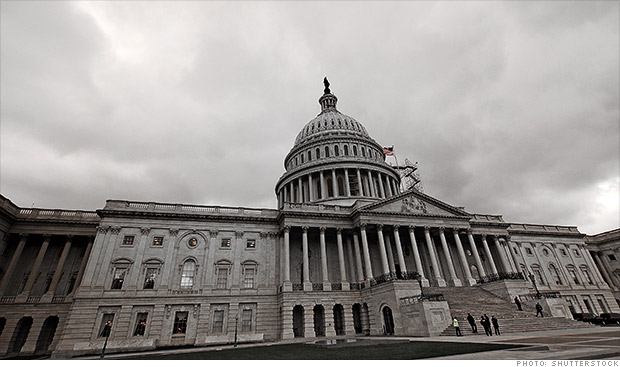
As year end approaches, Congress has left everyone guessing as to where things stand with the budget and other measures with a direct bearing on Americans' wallets.
NEW YORK (CNNMoney)
There's still a budget deal to be done and a farm bill to be passed, and there's a string of measures set to expire unless lawmakers act to extend them.
The issues at hand don't pose nearly the economic risk the fiscal cliff did at the end of 2012.
But for the unemployed, doctors, defense contractors and milk-buying parents everywhere, there's reason to be frustrated with lawmakers.
1. Milk prices could double: Lawmakers must pass a farm bill to ensure that dairy farmers continue to get federal subsidies by January 1. If they don't, the cost of a gallon of milk could soar to $7 or more. People are calling it the "dairy cliff."
2. Unemployment benefits could run out: An estimated 1.3 million long-term unemployed people will be cut off from federal jobless benefits by the end of the year. Another 850,000 could fall off the rolls within the first three months of 2014, according to the National Employment Law Project.
That's unless Congress chooses to extend, for the 12th time since 2008, the federally funded Emergency Unemployment Compensation program. That program provides benefits once a jobless worker's state benefits expire.
Democrats and the White House have been pushing to extend the benefits. But Republicans have objected to doing so, citing further cost among the reasons.
The Congressional Budget Office estimates that a one-year extension would cost $26 billion but boost economic growth by 0.2 percentage points next year and increase jobs by 200,000.
Related: No budget deal this week
3. Doctors' pay likely to remain a question mark: Come January 1, reimbursements to doctors who see Medicare patients are slated to be slashed by more than 24%. Unless, that is, Congress chooses to renew the so-called "doc fix," which averts scheduled cuts in doctor pay.
Lawmakers have extended it many times in the past decade. And they have said they would like to pass a permanent fix to the "sustainable growth rate formula," which helps determine the reimbursement levels. But they haven't done so yet, in part because figuring out how to pay for a permanent fix is difficult.
There's a good chance, however, that they will pass a short-term extension of perhaps three months, analysts say. That would give lawmakers time to figure out what to do long term.
But if they do opt for a short-term fix, uncertainty for doctors will persist for months to come.
4. Government could risk another shutdown: Everyone is saying that no one wants a repeat of October, when the federal government was partially shut down because some conservative Republicans refused to vote for government funding unless Obamacare was delayed.
If lawmakers haven't agreed to a one- or two- year funding bill by January 15, they are expected to pass a short-term funding bill to buy more time to reach a deal.
Then again, a lot of people thought a shutdown in October would never happen. So it's folly to entirely rule out the unthinkable. This is, after all, Congress we're talking about.
Related: Washington gridlock risks $7 milk
5. More federal cuts could be on the way: Everything depends on what deal, if any, budget negotiators can cut to replace some or all of the automatic funding cuts known as the sequester.
If there's no deal, funding will be cut by another $20 billion or so from fiscal 2013 levels, and the bulk of those new reductions would hit defense programs and defense contractors, some of which have recently announced job cuts.
But even for domestic programs, which were affected most by the 2013 sequester, there may be a shifting of funds in projects or services to meet the permanently lowered spending cap that would be in place absent a budget deal.
Or, if negotiators do agree to replace some of the 2014 sequester, they may choose to pay for it by raising airline passenger security fees and other so-called user fees, among various measures. ![]()
First Published: December 6, 2013: 3:49 AM ET
Anda sedang membaca artikel tentang
Washington's budget dysfunction: 5 ways it can affect your money
Dengan url
http://ngopingeteh.blogspot.com/2013/12/washingtons-budget-dysfunction-5-ways.html
Anda boleh menyebar luaskannya atau mengcopy paste-nya
Washington's budget dysfunction: 5 ways it can affect your money
namun jangan lupa untuk meletakkan link
Washington's budget dysfunction: 5 ways it can affect your money
sebagai sumbernya
0 komentar:
Posting Komentar